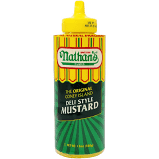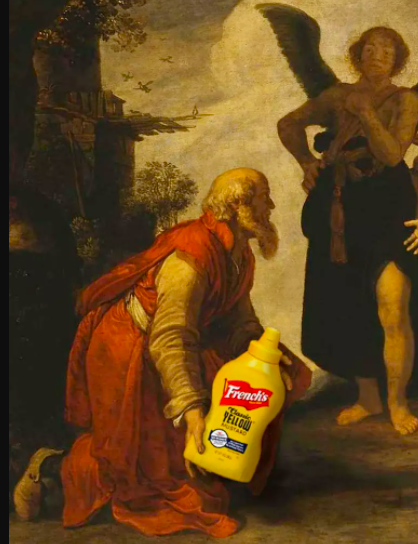
Like many writers, I enjoy crafting articles. It’s fun to explore different topics and, after all this time, I still get a kick out of seeing my byline in different outlets.
But publishing has changed in recent years, largely for the worse. Magazines and newspapers are constantly folding or getting bought out by large corporations, with a concomitant shift of staff and editorial priorities. Online publications often turn to content farms to fill their pages.
I’ve grown weary of the ongoing need to find a new home for each idea and, all too often, to chase down payment for my work. In my ideal world, I earn enough money polishing other people’s prose to concentrate on large projects of my own that I only have to convince one agent to represent or one publisher to buy. Easier said than done, I know, but my fantasy does not involve multiple rejections.
So after finishing my latest travel guide, in 2019, I started searching for the subject of my next book.
Mustard, My Heart’s Condiment

I decided on mustard.
As a food writer who doesn’t cook — don’t even get me started on the whole pandemic kitchen fetish — I wanted a topic that would take me on a cultural and literary journey without requiring recipes; think Salt: A World History, by Mark Kurlansky. Mustard promised to fit those criteria. Its seeds were found in Egyptian tombs and the Romans were the first to mix them with wine to create a sauce. Mustard seeds also appear in a biblical parable as a symbol of faith (not my bible but I’m ecumenical in my nonobservance and fond of metaphors).
And I love mustard. I put it on burgers, French fries…pretty much any classic American fare that requires a little extra pizzazz, and of course on deli. The other popular condiments? Salsa and Mexican food are a pairing I wouldn’t dare mess with; ketchup is a waste of calories; and, though I’m not opposed to mayonnaise when it’s mixed into tuna salad, say, the idea of adding an extra layer of bland goop on bread makes me queasy.
My search for competing books on mustard was not encouraging, however. I discovered several, a few of them comprehensive.
At first I told myself that didn’t matter. I’d almost been deterred from writing a dog book by the fear that the market was glutted. In the end, I decided that my perspective, that of a first-time dog owner with a bent for research and bad puns, was unique. And so Am I Boring My Dog: And 99 Other Things Every Dog Wishes You Knew was born.
Downsizing My Mustard Dreams
What distinct perspective did I bring to the yellow condiment canon, though? I wracked my brain and could think of only one: my Jewish roots. But was there sufficient material to fill The Great Jewish Mustard Book or Beyond the Bris: Cutting the Mustard in Jewish Tradition? I thought not. My book was clearly meant to be an article.
Happily, an editor at Tablet, the online magazine that had previously published my story about rolled beef, agreed.
And so my year-long book project morphed into How Mustard Became the King of Jewish Condiments.

I didn’t really mind. It turned out to be one of my favorite pieces of all time.
I had a blast doing the research. I interviewed the curator of the National Mustard Museum in Middleton, Wisconsin, a deli owner in Chicago, and a Talmudic food scholar in Tel Aviv. My Brooklyn high school boyfriend turned up in an anecdote too.
And I love the illustration. Sadly, the picture got a lot of heat on social media because it highlighted a bland commercial brand. In fairness, French’s is mentioned in the article in a historical context, its founding at the St. Louis World’s Fair in 1904. Maybe Abraham should have offered the angels Nathan’s Deli-Style mustard, but the art is too busy on that brand’s squeeze bottle (see image on top of the previous section). I applaud the aesthetics of the illustrator’s choice if not the literal taste of the original.
What About That Book,Then?
So now I was back at the drawing board, trying to find another book topic — but not quite looking at a blank page.
Funny thing. The Jewish mustard angle reminded me of a few facts:
- I have a Jewish blog.
- After nearly a decade, it has lots of content.
- I planned to write a book from my Freud’s Butcher material from the get-go, as per my original (2012) FAQ section.
So what happened? I think I’ve been suffering from logistical as well as emotional writer’s block.
I’ve always said I wanted to focus on the lives of my relatives, not their deaths. How would I end a family history without discussing their fates, exile at best but all too often murder? Also, I don’t know as much about some family members as I know about others. It seems unfair to give the less well-documented lives short shrift, but seeking out more and more details leads into a bottomless pit.
As for the emotional block, surprisingly enough, I’m not always in the mood to think about the Holocaust.
A Change in Genre–and A New Urgency
But it suddenly came to me: My book doesn’t have to be a family history. It could be — it should be — a memoir. I’m always documenting my reactions to the material I gather on this blog, re-evaluating what I thought I knew based on new evidence All family histories are subjective to a certain degree; authors like or dislike people they’ve come to know through letters or diaries based on their own preconceptions and experiences. A memoir just foregrounds that subjectivity.
Why now? Awareness of the Holocaust has dwindled over time. A 2020 survey of people under 40 by the Claims Conference found that one out of ten had never heard the word “Holocaust”; less than half knew the scope of the genocide. According to a summary by NBC news:
Sixty-three percent of those surveyed did not know that 6 million Jews were murdered in the Holocaust, and over half of those thought the death toll was fewer than 2 million. Over 40,000 concentration camps and ghettos were established during World War II, but nearly half of U.S. respondents could not name a single one.
Perhaps worse, 11 percent of respondents thought Jews caused the Holocaust. Another ten percent were either unsure that it happened or were certain that it hadn’t.
Not coincidentally, anti-semitism is on the rise on both the right and the left sides of the political spectrum. The right-wingers are more virulent and overtly dangerous, but I often get more upset by antisemitism on the left because progressivism is my political home and I expect better; don’t even get me started on BDS and the “but Israel…” crowd. Trump and Corbyn may be (more or less) gone but Trumpism and Corbynism live on.
I can’t predict whether my book will have any significant impact. I only know it’s time for me to honor my relatives and engage my anger about what happened to them, lest I allow history to repeat itself in silence.
Consider this the official announcement: I’ve begun writing Freud’s Butcher: A Memoir About Genealogy, Psychology, and Meat. If you know any agents or publishers who might be interested, give a holler.
Note: Thanks to Penelope Starr who provided me with the title of this post when I told her, in a writers’ Zoom, that the book I had been talking about for more than a year had become an article. “I guess that was Mustard’s Last Stand,” she said. I have no one but myself to blame for the never-to-see-the-light Beyond the Bris: Cutting the Mustard in the Jewish Tradition.


Your unfolding family story, Edie, with all its intriguing and heart-breaking discoveries, has been so totally absorbing all these years. Hooray that there’s a book to look forward to now!
Thank you, Lydia! I’ve been going over old posts, partly in preparation for writing, and realized again just how much you contributed to those discoveries.
Cool! And I just read your mustard article! Enjoyable and I learned a lot!
Thank you!